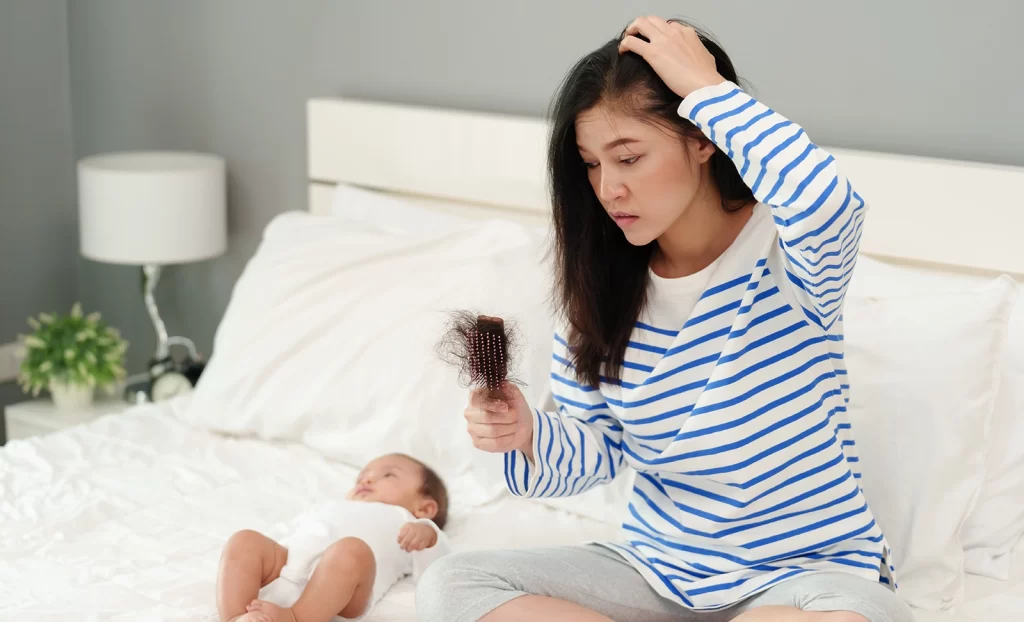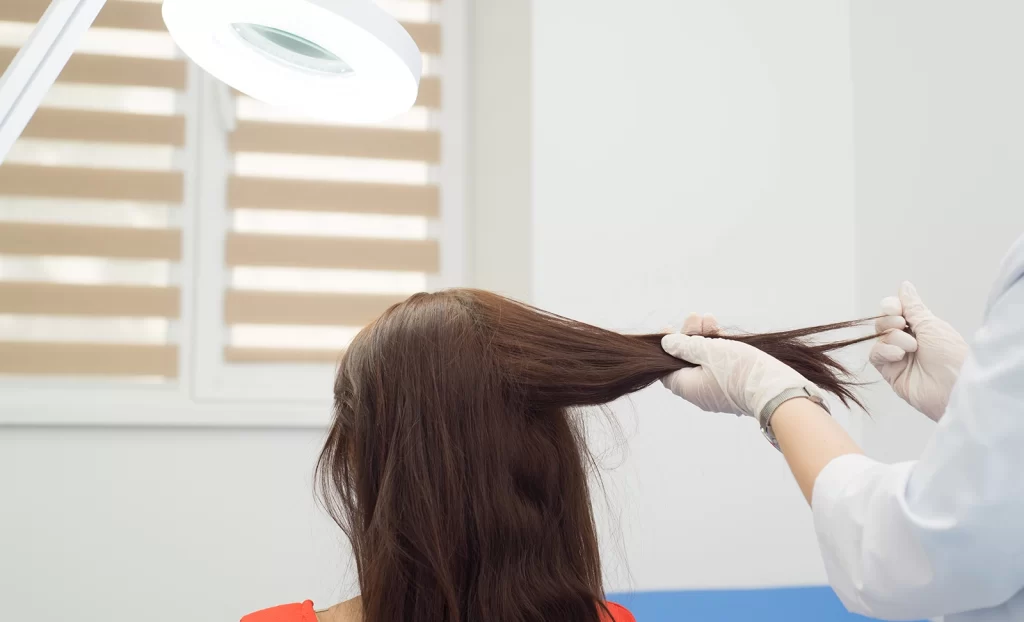Losing your hair can be scary. The first thing on your mind is likely: what is causing this? While the most common cause of hair loss is androgenetic alopecia, [1] also known as male or female pattern baldness, there are other potential reasons behind your hair falling out, with one of them being telogen effluvium.
Telogen Effluvium: What is it?
Telogen effluvium is a common type of alopecia (hair loss) that comes on suddenly and is caused by stress to the mind or body. It can happen to anyone and is a temporary form of hair loss, meaning the hair will eventually grow back, even without a hair loss treatment. It does not usually cause complete baldness all over the scalp; instead, sufferers may notice generally thinner hair.
What Causes Telogen Effluvium?
Telogen effluvium occurs when there is a disruption to the hair growth cycle. The normal hair growth cycle includes three distinct stages:
Anagen: When the hair grows.
Catagen: When the hair rests.
Telogen: When the hair sheds.
Telogen effluvium happens when more hairs than usual are in the telogen phase, which leads to excessive shedding and thinning hair. It is not always clear what causes telogen effluvium in a patient, but it is triggered by stress.
Common Telogen Effluvium Triggers
While there is not always a definitive cause in patients, there are some common triggers that often lead to telogen effluvium.
Childbirth: Childbirth is one of the most stressful experiences a person can go through, zapping both mental and physical energy – not to mention the pain. This extreme stress on the body can often lead to telogen effluvium, and the hormonal changes can make the hair loss even more pronounced.
Crash Diets: Crash diets involve a person significantly reducing their food intake, which often leads to a nutritional deficiency. This massive change to a person’s diet causes significant stress to the body, which leads to telogen effluvium.
Medication Changes: Changing a medication can seriously impact the body and put it under stress. If you stop or start taking a medication, such as an anti-depressant or birth control, it could trigger telogen effluvium.
A Major Life Event: Some of the most common major life events that trigger stress and, in turn, telogen effluvium include divorcing, getting made redundant, severe illness, and surgery.
A Health Condition: Certain health conditions can cause telogen effluvium. Thyroid conditions (hypothyroidism and hyperthyroidism), autoimmune conditions, and iron deficiencies, in particular, often lead to this type of hair loss.
Exposure to Heavy Metals: Exposure to heavy metals such as mercury and lead can lead to telogen effluvium. This is more of a concern for those in particular types of jobs, such as those who work on building sites.
Telogen Effluvium Signs
It is not always easy to determine the cause of your hair loss – is it telogen effluvium, or is your hair naturally getting a little thinner due to the natural ageing process? Here are some typical signs that you may have telogen effluvium:
Noticeable Hair Loss
The most obvious sign of telogen effluvium is noticeable hair loss. You might see some thinning on the scalp, such as a wider parting or a receding hairline.
Hair in Your Brush or Drain
Excessive hair fallout is another sign of telogen effluvium. In this case, you might notice more hair clogging your shower drain than usual or a hairbrush that gets full of hair much faster.
Spread-Out Hair Loss
Telogen effluvium usually leads to hair loss all over the scalp. If you experience hair loss in a singular area, that is likely due to something else.
A Sensitive Scalp
Scalp sensitivity is a common occurrence in those with telogen effluvium. Your scalp may feel drier and more tender than usual when you have this type of hair loss.
Hair that Grows Back
As mentioned, telogen effluvium is temporary hair loss. So, if you find your hair grows back within a matter of months, it’s likely you have telogen effluvium.
Try the Hair Pull Test
One of the easiest ways to see if you have telogen effluvium is by getting the hair pull test done in a clinic. It is not invasive and does not take too long. During the hair pull test, the clinician will grasp onto a clump of your hair (usually up to 60 strands at a time) and gently tug. The results are determined by the number of hairs that come out. It’s all about the percentage – if more than 10% of the hairs come out during the test that indicates hair loss.
Be aware that the hair pull test doesn’t mean you 100% have telogen effluvium, as it could also be a sign of anagen effluvium or alopecia areata. However, it does point you in the right direction, and with your other symptoms, it can lead to a more accurate diagnosis. You could also try a hair track app to keep track of your hair loss and growth.
How to Treat Telogen Effluvium Hair Loss
Telogen effluvium is temporary, but most people still want to treat it, as hair loss can be upsetting. Here are the most common treatment options.
Minoxidil
Minoxidil is an over-the-counter medication commonly known by its brand name Rogaine. It can be used by both men and women experiencing hair loss and boosts blood flow to the scalp, stimulating the hair follicles and encouraging the hair to grow. This medication works well for various types of hair loss, from androgenetic alopecia to telogen effluvium.
Supplements
If a diet change causes telogen effluvium, a good treatment option includes supplements. For example, if you have an iron deficiency, taking iron supplements can help your hair grow back.
Alternative Treatments
There are several effective alternative hair restoration treatments available, including microneedling, platelet-rich plasma injections, and low-level laser therapy. Many people experience positive results with these treatments, although they can be expensive if you require several sessions.
How to Prevent Telogen Effluvium
Preventing telogen effluvium is easier than treating it, as you won’t have to experience any form of hair loss that way. To prevent telogen effluvium, the key is to minimise any stress in your life and maintain a healthy routine. Getting enough vitamins and other nutrients from your diet is essential, and you should also focus on maintaining a good work-life balance. If you ever experience hair loss after taking a medication, speak to your general practitioner as soon as possible.
Other Types of Hair Loss
Hair loss is not always caused by telogen effluvium – there are many other potential causes to be aware of.
Androgenetic Alopecia: A genetic type of hair loss that affects most people at some point in life, although it’s more common in men.
Alopecia Areata: Alopecia areata is an autoimmune disease that attacks the hair follicles and leads to patches of complete baldness. It is not too common, affecting around 1 in every 500 to 1,000 people.
Traction Alopecia: Traction alopecia occurs when there is too much physical stress on the hair follicles. For example, wearing tight braids or a ponytail consistently can lead to thinning hair.
Anagen Effluvium: Anagen effluvium is hair loss caused by specific medications, such as chemotherapy. It is usually temporary, with the hair growing back once the medication stops.
Trichotillomania: Trichotillomania is a rare type of mental disorder that causes a severe urge to pull out hairs, most commonly from the scalp. The frequent pulling often leads to bald and thinning patches.
Alopecia Universalis: A very rare form of alopecia is alopecia universalis, which causes complete hair loss all over the body. It is an autoimmune condition and there is not yet a cure.
Are You Struggling with Hair Loss?
If you are struggling with hair loss – whether it’s telogen effluvium or something else – then it helps to have somewhere to turn. Beginning a hair restoration journey means getting on a path towards restored confidence. Here at Harley Street Hair Clinic, we have already helped many patients achieve hair growth, letting them enjoy a full head of hair once more. Our hair transplant treatments use the latest and greatest method of FUE (follicular unit extraction), and our surgeons are undoubtedly the best in the business. If you want to see what we can do for you and your locks, head to our patients gallery. We have even helped big names like Wayne Rooney!
Telogen Effluvium Alopecia: In Summary
Telogen effluvium is a temporary type of hair loss that occurs after some kind of stressor, whether that’s a change in medication, a significant life event like pregnancy, or a crash diet. Being only temporary, the hair will usually grow back without treatment, but there are treatment options to help speed up hair regrowth, such as minoxidil and low-level laser therapy.
For more permanent hair loss, you will require a more permanent solution like a hair transplant. If you are looking for a hair loss treatment that will give you a full head of hair forever, you’re in the right place – contact our friendly team today or browse our website to see what we can offer.
Sources:
- https://www.mayoclinic.org/diseases-conditions/hair-loss/symptoms-causes/syc-20372926#:~:text=Hereditary%20hair%20loss%20with%20age,hair%20loss%20or%20restore%20growth.
- https://medlineplus.gov/genetics/condition/alopecia-areata/#:~:text=Frequency&text=Alopecia%20areata%20affects%201%20in,%2Dpattern%20baldness%20in%20women).





